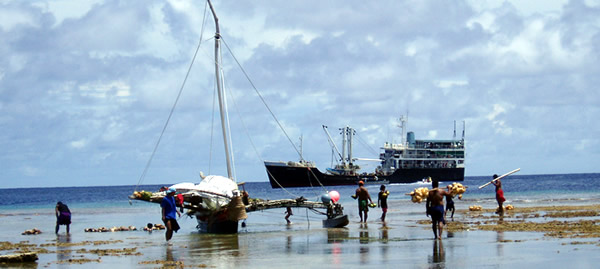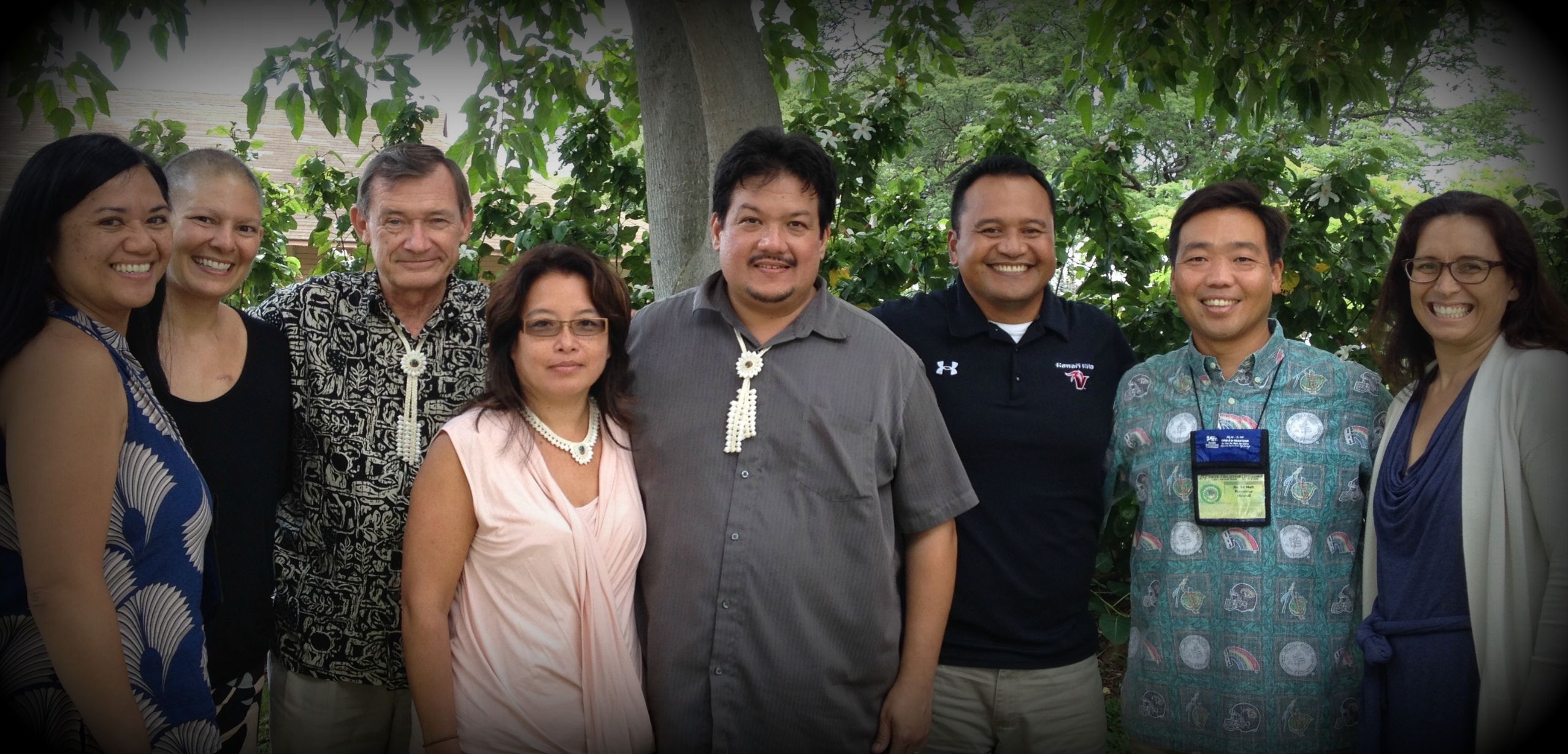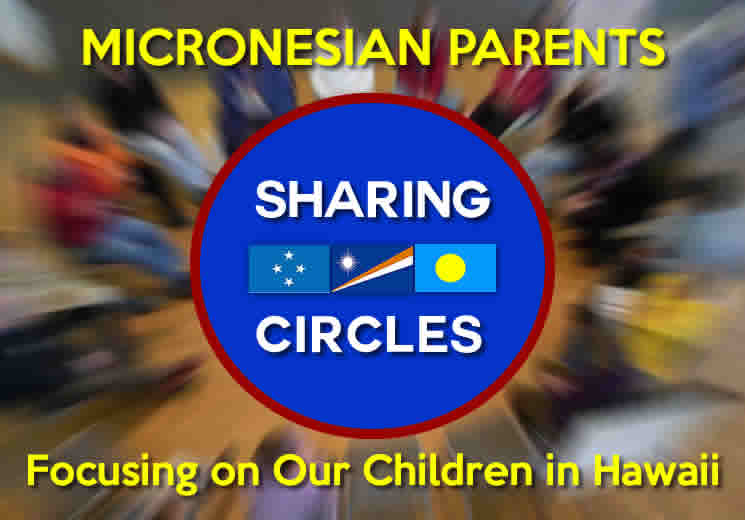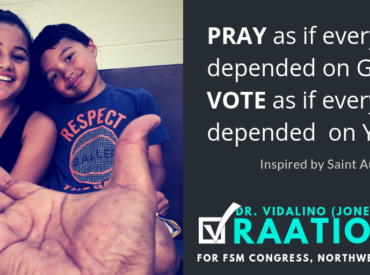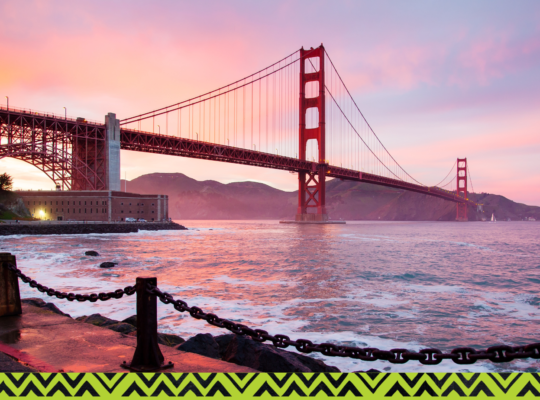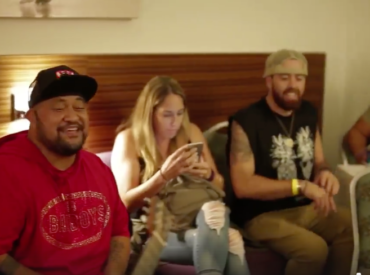The doctoral studies journey has challenged me to consider the possibility that I have been mis-educated all these years. How should I untangle this fitikoko (problematic) history of the mis-education of indigenous children in public school systems throughout the Micronesian region? It has taken me 49 years to begin to realize that the more I learn about Western theories in this doctoral program, the more ignorant I become in my native knowledge.
This reflection attempts to highlight the most pivotal experiences that have shaped my core beliefs as a Chuukese, educator, leader. Is it possible that I have been mis-educated all these years? Must I begin to reclaim my histories, reconnect with my indigenous theology, recalibrate my self-understanding, revisit my roots, reclaim my traditions, re-own my innate goodness?
My Mis-Educated Years
Growing up in Chuuk during the years of American hegemony known as the (dis)Trust Territory of the Pacific Islands (TTPI), I attended public schools that had been created after the WWII by the American administration which had agreed to rebuild the war-torn islands. The Americans set up public schools, brought in teachers and later Peace Corps Volunteers to “educate” the indigenous children. Instead of creating schools that would have helped us embrace the beauty of our own systems of government, understand our own history, learn from the ocean and lands like our ancestors, the Americans did exactly as the preceding colonialists did; they created a school system modeled after their own to form pro-American allies.
Had I been properly educated in the schools, I would have been taught first and foremost of my heritage as the grandson of Paramount Chief Raatior, a pwo (master navigator) who served his people with humility, wisdom, and strength. I would have treated such a blood lineage with the utmost respect as the foundation of any formal learning. My education would have revolved around understanding the indigenous responsibilities of a chiefly family…a balancing act of humility, honor, strength, dignity, and righteousness.
Yet, I was mis-educated in a sub-standard Chuuk State public school system. In that system I was always consistently placed in the top 10 of my class throughout elementary, middle, and secondary years. Yet, I had lost valuable time to learn my lineage, history, value systems worthy of a traditional chief, and the traditional chants and oratory skills of an indigenous leader. I went on to college and finished a bachelors degree in communications. I was book smart in an American system, but life ignorant in the indigenous Micronesian Ways. That’s not right.
My Re-Education with the Jesuits
My decision to become a Jesuit after college became a pivotal experience in my re-education. For 10 years of my adult life, I was formed as a member of this global fraternity of mostly liberal-minded Catholic priests whose main ministry is education.
If college taught me to ask questions, the Jesuit formation demanded that questions lead to actions. It was the start of my awareness of social justice issues. Merely questioning the reality was mediocre; good answers must be judged by the positive impact on the world. Jesuits were formed to be “contemplatives in action” i.e. prayer was in the form of service to the world…deliberately different from the monastic life at the time of the Reformation. The role of education became more than just learning other people’s realities, histories, cultures, and the English language. Good education frees one from self-imposed oppression.
My re-education took on a life-changing course when I became a teacher at Xavier High School, the premiere college preparatory school in the Micronesian region. Having been a product of most of the worst public schools in the nation of the FSM, it was quite humbling to return to Chuuk to teach at arguably the best school in the nation. It was at this school whose alumni is a Who’s Who of heads of state, politicians, educators, doctors, diplomats, business leaders that I became aware of a growing desire to fully embrace the beauty of my Micronesian heritage.
On that campus of the top 160 students from the three nations of the FSM, Palau, and the Marshall Islands I embraced my new role as a Micronesian role model. I was expected to be a teacher – leader who had something truly to offer to the world of other Micronesian young minds. I was no longer a consumer of educational views, but one who was teaching knowledge to the smartest of our 3 nations. I was formed by the Jesuits spiritually, intellectually, socially, politically, mentally, and vocationally. But my Micronesian students formed my Micronesian roots.
Embracing of my vocation as a Micronesian leader eventually gave me the impetus and courage to leave the Jesuit life. I felt a deeper calling to use my re-educated mind to help the emancipation of my fellow Micronesians from their own mis-education about our rightful place in the world.
De-Education…My Doctorate Experience
As a doctoral student at UH Manoa, an educator at UH Hilo, and Pacific-focused educational consultant, I am on a journey of de-education. What I had long held as constitutive component of my growth, i.e. ideologies from foreign priests, historians, researchers, intellectuals, Peace Corps, and anthropologists, actually contributed to my demise as an indigenous Chuukese. I need to de-educate myself from these colonialistic attitudes.
Now I can no longer accept these foreign theoreis as the only lens to view my people’s existence. I have to come to terms with the reality that have made me less Micronesian. Every book I read, every theory I learn are no longer good enough for me if these foreign concepts fail to help me formulate what is authentically Micronesian or Chuukese. For me, academia is no longer an ivory tower, but rather a glass tower of self-righteous intellectuals whose theories must be challenged.
While Micronesia has since reclaimed its sovereignty with several outward legal documents with the U.S. and the United Nations, the truth is that we have lost much of ourselves along the way. Sadly, we are the product of a long history of colonialism in which our identities have suffered greatly at the hands of overzealous foreigners. They arrived uninvited on the shores of our pristine islands in many forms, causes, and agendas…all with the same misplaced notion of “helping” us by displacing our native names, our spiritualities, cultures, traditions, governing structures, diets, and our lives in the name of their foreign gods, ideology, self-proclaimed governments, unjust economies, and their social and physical illnesses.
Every dominant foreign government has forced their educational system upon us. Since WWII, the American system has been operative in the islands. Consequently, Micronesians have been taught in schools to learn the English alphabets at the expense of our own language, adapted our local governance structures to the democratic system, taught to compete against each other in academic achievements through the Western grading systems, handed textbooks to read about America at the expense of knowing our own stories and history. Our education moved from the wisdom of the community elders to the credentialed (or in many cases unqualified) classroom teachers. Our experiential learning moved from the ocean and the taro patches to a classroom comprised of substandard external textbooks, a chalkboard, and untrained teachers in a foreign way of being.
Conclusion
It has taken me 49 years to realize that I have gone from the far end of the spectrum of an educational journey; from the early years of being unjustly mis-educated in youth to receiving what I thought was a college education only to be re-educated in graduate studies as a Jesuit. Today, I embrace the role of doctoral studies as a time to de-educate, de-colonize myself from all the disabling theories held by foreigners, embrace those viewpoints which enhance our indigenous ways, and to reclaim the true meaning of education (educere = from within). I can no longer settle into the mediocrity of educational consumerism, but rather to embrace the vocation of authentic leadership. As such I must lead educational reform for Micronesians to become more of ourselves and less foreign in our own lands. Reclaiming our own educational system must be our top priority as authentic educational leaders.
